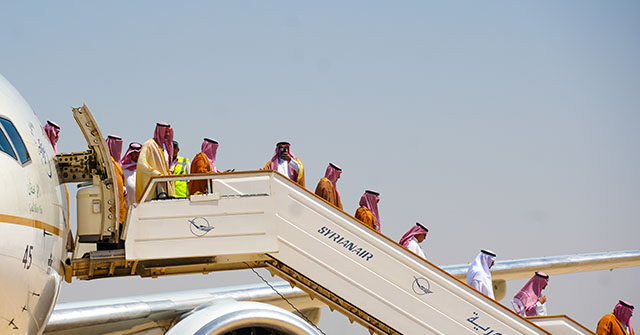A massive delegation of Saudi businessmen led by Saudi Minister of Investment Khalid bin Abdulaziz al-Falih visited Damascus, Syria, on Wednesday for a forum allegedly resulting in over $6 billion in investment commitments to rebuild the war-torn nation.
The government of jihadi warlord President Ahmed al-Sharaa welcomed over 130 participants to the Syrian-Saudi Investment Forum, according to the state-run Syrian Arab News Agency (SANA), designed to facilitate the participation of Saudi corporations in bolstering the Syrian economy. Among the fields attracting the most interest for Saudi Arabia are real state development, the rebuilding of a national electrical and telecommunications grid, and establishment of safe and attractive tourist sites.
The Investment Forum was made possible by the decision President Donald Trump made in May to support the new Syrian government. Trump met Sharaa in person during a tour of the Middle East in May – at the behest of the Saudi government – praising him as a “young, attractive guy, tough guy” who has “got a real shot at pulling it together” for the country. Trump formally lifted sanctions on Syria, imposed during the tenure of dictator Bashar Assad, in late June.
Sharaa became president of Syria after his jihadist terror organization, the al-Qaeda offshoot Hayat Tahrir al-Sham (HTS), overthrew Assad’s regime in December. The HTS victory preceded over a decade of civil war that grew to involve over ten different factions and outside actors, notably including the governments of Russia and Iran. Trump also delisted HTS as a terrorist organization and lifted sanctions on Sharaa himself to allow for international investment to rebuild the country following the war.
With sanctions out of the way, Sharaa’s ability to attract international investment to rebuild Syria will depend heavily on maintaining control over his faction of jihadis and preventing sectarian, and often genocidal, violence to erupt uncontrollably in the country. In the past seven months, Syria has witnessed Sunni jihadist terrorists engage in multiple rounds of genocidal violence, including the attempted extermination of Alawite Shiite Muslims in March and the more recent slaughter of Druze people at the hands of Bedouin attackers this month.
Concerns about the nation’s stability under Sharaa were naturally absent in SANA’s coverage of the Saudi investment forum. Participants instead celebrated the potential of Saudi Arabia now being able to invest billions of dollars into Syria without concerns about American sanctions.
Al-Falih, the Saudi investment minister, said during the forum on Wednesday that Riyadh was seeking to make “significant investments … in all sectors,” and that he expected 47 deals to be signed at the forum, totaling about $6.4 billion in value.
“I convey to Syria and its beloved people the greetings of the King and Crown Prince, along with their reaffirmation of the Kingdom’s steadfast and supportive stance toward it in its blessed journey toward growth, prosperity, and sustainable development,” al-Falih asserted. SANA added that the minister detailed some of the deals would include building three cement factories, multiple telecommunications projects, and help to restore Syria’s agricultural sector.
“The minster asserted that Crown Prince Mohammed bin Salman has urgently ordered the establishment of a Saudi-Syrian Business Council comprises the highest-level businessmen,” SANA added.
The Saudi news agency Al-Arabiya quoted Syria’s Information Minister Hamza al-Mustafa stating that the government expects the projects to create 50,000 jobs in the country, celebrating the economic potential of the partnership. The outlet also reported that some Saudi companies have already begun work on new projects in Syria in addition to those announced during the forum.
One of these new projects appears to be a cement factory in Damascus, an essential facility to support the construction projects developers have agreed to in the country. SANA reported that, as part of the forum, Saudi investors formally launched the construction of the Fayhaa Cement Factory on the outskirts of Damascus.
“The Saudi Minister of Investment stressed that the investment environment in Syria is encouraging and depends largely on the role of the private sector in the reconstruction process and market expansion,” SANA reported, “benefiting from Syria’s natural resources and distinctive geographical location as a gateway between the Arabian Peninsula and the Mediterranean Basin.”
SANA also touted on Thursday the beginning of the construction of a real estate project, the Al-Jawhara Tower in central Damascus, by Saudi developers.
To attract enough development to reverse the destruction of the last decade, Sharaa’s Syria will have to offer foreign investors safety, diminishing the possibility of rampant sectarian violence. The latest episode of such killings offered in the Druze stronghold of Sweida, where a group of Bedouin attackers kidnapped and robbed a Druze resident, triggered a response by the Druze that escalated into wanton violence, reportedly against hospital patients and medical workers. Some Druze in Sweida narrated to the Emirati newspaper The National this week that the Syrian government’s response to the clashes, sending in its “security forces,” resulted in even more bloodshed.
“Medical teams were shot dead while trying to save people,” one eyewitness narrated.
In a national address this week, Sharaa laid the blame for the violence squarely on the Druze and applauded the Bedouin tribesmen for the “heroic” attacks on Druze locals. He commanded the Bedouins, however, to stop the attacks, and has deployed buses to evacuate the Bedouins from the Druze era. He also condemned the government of Israel, which conducted airstrikes against the Syrian armed forces in response to calls for support from the Druze communities. Sharaa withdrew his own forces from Sweida this weekend.
Follow Frances Martel on Facebook and Twitter.
Read the full article here
